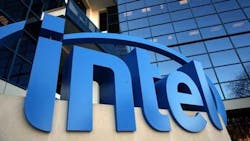Intel Fights Record $1.2 Billion Antitrust Fine at Top EU Court
Intel Corp. attacked the European Commission for being unfair in a probe that led to a record $1.2 billion fine.
The key issue in the investigation was loyalty rebates to lower retail prices, Daniel Beard, a lawyer for Intel, told the European Union’s Court of Justice in Luxembourg on June 21. But the European Commission failed to analyze “all relevant circumstances” to see if the rebates shut out rivals, he said.
The world’s biggest chipmaker is making a final attempt to overturn the penalty doled out in 2009 for unfairly squeezing out Advanced Micro Devices Inc. No date for a ruling has been set.
Two years ago, the EU General Court rejected Intel’s first appeal. That ruling was a timely boost to the Brussels-based European Commission, which is embroiled in lengthy probes of search engine giant Google and chip designer Qualcomm Inc. Regulators say Google gave financial incentives to telecommunications operators and phone makers that install its search app. They also allege Qualcomm paid a smartphone and tablet manufacturer to mostly use its chips.
Large Market Share
The Intel case concerns whether a company with a very large market share “can pursue a commercial strategy, the focus of which is the marginalization or even the elimination of its only competitor,” the commission’s lawyer Nicholas Khan told the court June 21.
The evidence shows that the rebates prevented computer makers from seeking out lower prices “that might have been available,” he said.
The EU’s antitrust regulator in its decision said Intel had obstructed competition by giving rebates to computer makers from 2002 until 2005 on the condition that they buy at least 95% of chips for personal computers from Intel. Intel then imposed “restrictive conditions” for the remaining 5%, supplied by AMD, which struggled to overcome its rival’s hold on the market for PC processors, the EU said.
The computer makers coaxed to not use AMD’s chips included Acer Inc., Dell, Hewlett Packard Enterprise Co., Lenovo Group Ltd. and NEC Corp., the commission said in 2009. The EU also said Intel made payments to electronics retailer Media Markt on the condition that it only sell Intel-based PCs. The EU also ordered Intel to stop using illegal rebates to thwart competitors, an instruction that Intel complained was unclear.
By Stephanie Bodoni
About the Author
Bloomberg
Licensed content from Bloomberg, copyright 2016.
